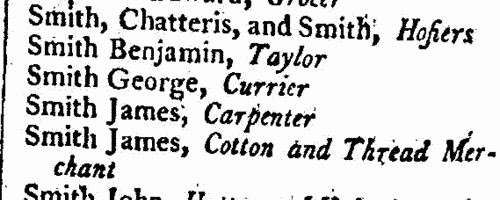Dinnes Surname Ancestry ResultsOur indexes 1000-1999 include entries for the spelling 'dinnes'. In the period you have requested, we have the following 3 records (displaying 1 to 3): Buy all | | | Get all 3 records to view, to save and print for £14.00 |
These sample scans are from the original record. You will get scans of the full pages or articles where the surname you searched for has been found. Your web browser may prevent the sample windows from opening; in this case please change your browser settings to allow pop-up windows from this site. Scottish litigants, rebels and cautioners
(1585-1592)
The Privy Council of Scotland exercised a superior judicial authority in the kingdom, and consequently received and dealt with a constant stream of petitions, as well as dealing with the internal security of the state. This register of the council from 1 August 1585 to 31 July 1592, in the reign of king James VI, was edited by David Masson, and published under the direction of the Lord Clerk Register of Scotland in 1881. Some of the individuals mentioned are the complainants, those of whom they complained, and the sureties on both sides: at this period, some of the complainants are alleging serious attacks, often of a feuding nature. Many of the bonds entered into by the cautioners are promises to keep the peace towards such enemies. Failure to answer to the council when summoned was a serious contempt, leading to being denounced a rebel, with serious consequences. But 'horning' was also used in the pursuit of debts: there was no imprisonment for debt in Scotland, but a creditor could have an obstinate debtor ordered, in the sovereign's name, to pay what was due, failing which, the debtor could be put to the horn, denounced as a rebel, and imprisoned as a rebel. The main text (to page 774) is from the Acta Secreti Concilii, containing the minutes of the Privy Council, with intermixed Acta Proper (political edicts), Decreta (judicial decisions), Acta Cautionis (acts of caution) and Bands (registration of bonds). After that are printed some miscellaneous Privy Council documents from the same years: additional acts of caution (775-778); ordinances and acts anent the Borders and the North (779-814); and miscellaneous privy council papers (815-834). The sources most productive of names, the Acta Cautionis and Registration of Bands, are also the most repetitive in form, and are not transcribed verbatim and literatim: nevertheless, one of the editor's rules was for 'All proper names and names of places occurring in the originals to be preserved in the abstracts without exception, and in the exact original spelling.'
DINNES. Cost: £4.00.  | Sample scan, click to enlarge

| Inhabitants of Penzance in Cornwall
(1790-1797)
The provincial sections of the Universal British Directory include lists of gentry and traders from each town and the surrounding countryside, with names of local surgeons, lawyers, postmasters, carriers, &c. (the sample scan here is from the section for Nottingham). The directory started publication in 1791, but was not completed for some years, and the provincial lists, sent in by local agents, can date back as early as 1790 and as late as 1797.
DINNES. Cost: £6.00.  | Sample scan, click to enlarge

| Flight Lieutenants: General Duties Branch
(1957)
The Air Force List for 1957 contains gradation lists for all serving officers, corrected, generally, up to the appointments and promotions gazetted 2 April 1957. The officers are listed by branch, rank, and date of seniority; the names are given surname first, initials, decorations, and various sets of initials relating to their particular qualifications or expertise. A double-headed dagger before the name denotes a permanent direct commission; a dagger a national service commission; an asterisk some other non-permanent commission. The main abbreviations are: a. a., qualified at Army Long Gunnery Staff Course (A. A.); c. f. s., qualified flying instructor (with an asterisk if A1 category, without, A2); I, 1st class interpreter; i, 2nd class interpreter; i. d. c., completed a course at the Imperial Defence College; j. s. s. c., completed a course at the Joint Service Staff College; P, on probation; p. f. c., graduate of Pilot Flying College; p. s. a., graduate of R. A. F. Staff College; p. s. c., graduate of Military Staff College; q. s., R. A. F. graduate of the Military or Naval Staff College; Sp, medical or dental specialist; t. p., graduate of Empire Test Pilots' School; Z, qualified in A. I. S. Inspection Duties. In the Ground Section lists a further set of abbreviations, in bold in brackets in front of the names, identifies certain specialities - AcC, aircraft control; Bal, balloon; FC, fighter control; Ph, photographic; PhI, photographic interpretation; RS, radar supervisor.DINNES. Cost: £4.00.  | Sample scan, click to enlarge

|
Research your ancestry, family history, genealogy and one-name study by direct access to original records and archives indexed by surname.
|





